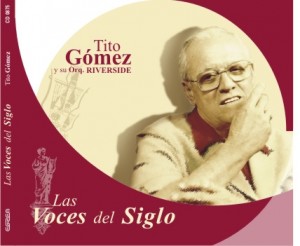In 1938 José Antonio Tenreiro Gómez, a young man of eighteen debuts as singer of Osvaldo Estivill’s Orchestra, with which first enters into a studio to record an album that will now identified with the stage name of Tito Gomez.
Then in 1949 becomes part of one of the most famous jazz band at the time, the Riverside Orchestra, immediately hitting the subject Mambo in Spain, after which convinced him to include in one of his records, almost as a filling and unpretentious, a version of Vereda chachachá tropical Mexican composer’s work Gonzalo Curiel, with which obtained a gold record for selling one million plates.
It was in the late ’40s when brothers Rigual from Mexico, Tito Gomez advised him to include in an album of orchestral piece Riverside that Gonzalo Curiel.
The blonde singer, son of a Spanish businessman, did not like the idea, because this issue was already known in the voices of Pedro Vargas, Tona la Negra and other artists of renown. The Rigual insisted they would be successful in the style of the young singer and was included, without much enthusiasm, almost filling the album.
However, it immediately became a hit at that contributed the voice of Gomez luxury, excellence of the music and lyrics of Curiel, the jazz-band arrangement of the orchestra Riverside and between sad and happy atmosphere.
The time was romantic, people danced and artistic groups had been imposed as a goal bringing happiness to couples, families and join her company to the lonely through the magic of music.
http://www.youtube.com/watch?v=qrMsksibnvY
As Barbarito Diez, Tito Gomez did a gesture to sing, everything was with his ringing voice and the unique. Without a doubt the greatest improviser gave the country until today, under recognized by giants like Benny Moré and Miguelito Valdes.
In a song like I stretch racks was able to project an improvisation over half an hour without repeating a phrase or falling into vulgarity. At the request of this reporter about that, its great qualities, once said with a smile: “I can not repeat myself, I have that ability.”
Years later went into retirement, which was constantly called by radio and television until his death.
When speaking of the elite group in the Olympus of the Cuban singers must be indicated, along with Benny Moré and Miguelito Valdés, José Antonio Tenreiro Gomez, better known as Tito Gomez.
The immortal Vereda Tropical interpreter died October 15, 2000, at 80 years of age. The passage of time did not impair his voice. Still singing Vereda … in the same record with the first performed.
Sources: Wiki/LaJiribilla/InternetPhotos/YouTube/TheCubanHistory.com
Tito Gomez y La Riverside/ The Cuban History/ Arnoldo Varona, Editor
ORQUESTA RIVERSIDE CON TITO GOMEZ CANTANTE
En 1938 José Antonio Tenreiro Gómez, un joven de dieciocho años debuta como cantante de la Orquesta de Osvaldo Estivill, con la cual entra por primera vez en un estudio para grabar un disco en que aparecerá identificado ya con el nombre artístico de Tito Gómez.
Luego en 1949 pasa a formar parte de una de las jazz band más célebres de la época, la Orquesta Riverside, pegando de inmediato el tema Mambo en España, luego de lo cual le convencen de incluir en uno de sus discos, casi a manera de relleno y sin muchas pretensiones, una versión en chachachá de Vereda tropical, obra del compositor mexicano Gonzalo Curiel, con la que obtendría un Disco de Oro por el millón de placas vendidas.
Fue a finales de la década del 40 cuando los hermanos Rigual, procedentes de México, le aconsejaron a Tito Gómez que incluyera en un disco de la orquesta Riverside esa pieza de Gonzalo Curiel.
Al rubio cantante, hijo de un comerciante español, no le agradó la idea, pues este número era ya conocido en las voces de Pedro Vargas, Toña la Negra y otros artistas de nombradía. Los Rigual insistieron en que sería un éxito en el estilo del joven cantor y fue incluida, sin mucho entusiasmo, casi de relleno, en el álbum.
Sin embargo, se convirtió inmediatamente en un exitazo al que contribuyeron la voz de lujo de Gómez, la excelencia de la música y la letra de Curiel, el arreglo para jazz-band de la orquesta Riverside y una atmósfera entre triste y alegre.
La epoca era romántica, la gente bailaba y las agrupaciones artísticas se habían impuesto como meta hacer felices a las parejas, unir a las familias y hacerle compañía al solitario mediante la magia de la música.
http://www.youtube.com/watch?v=qrMsksibnvY
Como Barbarito Diez, Tito Gómez no hacía un gesto al cantar, todo lo daba con la voz y ese timbre suyo, único. Sin lugar a duda, es el improvisador más grande que dio el país hasta hoy, virtud reconocida por gigantes como Benny Moré y Miguelito Valdés.
En una canción como Estiro bastidores era capaz de proyectar una improvisación de más de media hora sin repetir una frase ni caer en la vulgaridad. A instancias de este cronista sobre esa, su cualidad genial, opinó una vez con una sonrisa: “No puedo repetirme, no tengo esa habilidad”.
Años después marchó al retiro, del cual era reclamado constantemente por las emisoras de radio y televisión hasta su deceso.
Cuando se hable del grupo de elite en el Olimpo de los cantantes cubanos, habrá que mencionar, junto a Benny Moré y Miguelito Valdés, a José Antonio Tenreiro Gómez, más conocido como Tito Gómez.
El inmortal intérprete de Vereda Tropical falleció el 15 de octubre del 2000, a los 80 años de edad. El paso del tiempo no menoscabó su voz. Todavía cantaba Vereda… en el mismo registro con que la interpretó por primera vez.
Sources: Wiki/LaJiribilla/InternetPhotos/YouTube/TheCubanHistory.com
Tito Gomez y La Riverside/ The Cuban History/ Arnoldo Varona, Editor



 Riverside Orchestra, Tito Gómez (Video) * La Orquesta Riverside, Tito Gómez, Cantante.
Riverside Orchestra, Tito Gómez (Video) * La Orquesta Riverside, Tito Gómez, Cantante.

